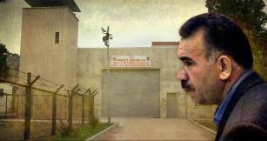Foreign Policy Implications of the Turkish Crisis
By the Editors (vol. 1, no. 3 of the Turkey Analyst)
In the past month, Turkey experienced high levels of internal and external turmoil. Turkey launched a large military operation in northern Iraq, which created acrimony as the subsequent pullout was questioned by the opposition.. Meanwhile, the country’s internal turmoil deepened. This internal crisis is making the conduct of a coherent foreign policy increasingly difficult, with serious implications for its ability to play a role as a regional power.
One Step from the Brink: Turkey's Kurdish Peace Process Edges Closer to Collapse
By Gareth H. Jenkins (vol. 6, no. 16 of the Turkey Analyst)
On September 9, 2013, the Kurdistan Workers’ Party (PKK) announced that it had halted the phased withdrawal of its militants from Turkey but would continue with its temporary ceasefire in order to give the Turkish government a last opportunity to meets its demands for greater rights for the country’s Kurdish minority.

The AKP's New Dialogue with Öcalan: A Process but Which Process?
by Gareth H. Jenkins (vol. 6, no. 1 of the Turkey Analyst)
On January 9, 2013, three female Kurdish nationalist activists affiliated with the Kurdistan Workers’ Party (PKK) were assassinated execution-style in the heart of Paris. They included Sakine Cansız, the doyenne of the Kurdish women’s movement and one of the original founders of the PKK. On December 28, 2012, Turkish Prime Minister Recep Tayyip Erdoğan had announced the beginning of a new dialogue with imprisoned PKK leader Abdullah Öcalan to try to put an end to the PKK’s 28 year-old insurgency. The timing of the Paris killings has meant that they have been interpreted as being linked to the dialogue; with Kurdish nationalists and Turkish government supporters each effectively accusing elements within the other of responsibility. Although both sides have called for the dialogue with Öcalan to continue, many Kurdish nationalists have serious doubts about the Turkish government’s sincerity, suspecting that Erdoğan’s main aim is to weaken and marginalize the PKK rather than address the underlying grievances that fuel its insurgency.
Calculating Ambivalence: The Imrali Process and the Balance Between Kurdish and Turkish Nationalist Violence
by Gareth Jenkins (vol. 6, no. 9 of the Turkey Analyst)
On May 8, 2013, the Kurdistan Workers’ Party (PKK) formally began to withdraw its militants from Turkey as part of the peace negotiations between the ruling Justice and Development Party (AKP) and imprisoned PKK founder Abdullah Öcalan. Prime Minister Recep Tayyip Erdoğan is likely to wait until the withdrawal is complete – a process that could take several months – before announcing what, if any, concessions he is prepared to make to Kurdish nationalist demands. Managing the resultant uncertainty will be a major challenge, particularly given the diametrically opposed hopes and fears of Kurdish nationalists and Turkish nationalists. Erdoğan’s record suggests that the Kurds have more reason to be skeptical. But, in the short-term, assuaging Turkish nationalist fears could prove to be the greater problem.





